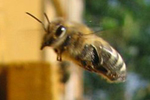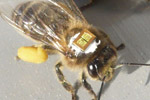
Honey bee (Apis mellifera) collecting pollen. Photo by: Jon Sullivan.
Following a flood of damning research on the longterm impact of neonicotinoid pesticides on bee colonies, the EU is proposing a two year ban on the popular pesticides for crops that attract bees, such as corn, sunflower, oil seed rape, cotton. The proposal comes shortly after European Food Safety Authority (EFSA) released a report that found neonicotinoid pesticides posed a “number of risks” to bees.
Last year a number of high-profile studies found significant impact on bee colonies from neonicotinoid pesticides, including fewer queens and bees losing their way during foraging. One study found that bees fed with pesticide-laced high fructose corn syrup resulted in the complete collapse 15 out of the 16 hives within 23 weeks. Many scientists now believe that neonicotinoid pesticides may be a primary driver behind Colony Collapse Disorder, which has hit bee populations across the U.S. and Europe.
However, Bayer, one of the largest producers of the neonicotinoid pesticides, staunchly defends their chemicals and has called the proposed ban “draconian.”
Bees are indispensable pollinators for many agricultural crops and provide massive ecosystem services for the global economy. For instance it has been estimated the economic value of honeybees in the U.S. is worth $8-12 billion.
“Protecting the health of our bee population is of great importance not only for our European agricultural sector but also for our ecosystem and environment as a whole,” European Commissioner for Health and Consumer Policy, Tonio Borg, said on announcing the proposal.
The EU will vote on the ban later this month.
Related articles
New study adds to evidence that common pesticides decimating bee colonies

(10/24/2012) The evidence that common pesticides may be partly to blame for a decline in bees keeps piling up. Several recent studies have shown that pesticides known as “neonicotinoid” may cause various long-term impacts on bee colonies, including fewer queens, foraging bees losing their way, and in some cases total hive collapse. The studies have been so convincing that recently France banned the use of neonicotinoid pesticides. Now a new study finds further evidence of harm caused by pesticides, including that bees who are exposed to more than one chemical, i.e. neonicotinoid and pyrethroid, were the most vulnerable.
After damning research, France proposes banning pesticide linked to bee collapse
(06/04/2012) Following research linking neonicotinoid pesticides to the decline in bee populations, France has announced it plans to ban Cruiser OSR, an insecticide produced by Sygenta. Recent studies, including one in France, have shown that neonicotinoid pesticides likely hurt bees’ ability to navigate, potentially devastating hives. France has said it will give Sygenta two weeks to prove the pesticide is not linked to the bee decline, known as Colony Collapse Disorder (CCD).
Researchers recreate bee collapse with pesticide-laced corn syrup

(04/05/2012) Scientists with the Harvard School of Public Health (HSPH) have re-created the mysterious Colony Collapse Disorder in several honeybee hives simply by giving them small doses of a popular pesticide, imidacloprid. Bee populations have been dying mysteriously throughout North America and Europe since 2006, but the cause behind the decline, known as Colony Collapse Disorder, has eluded scientists. However, coming on the heels of two studies published last week in Science that linked bee declines to neonicotinoid pesticides, of which imidacloprid is one, the new study adds more evidence that the major player behind Colony Collapse Disorder is not disease, or mites, but pesticides that began to be widely used in the 1990s.
Smoking gun for bee collapse? popular pesticides

(03/29/2012) Commonly used pesticides may be a primary driver of the collapsing bee populations, finds two new studies in Science. The studies, one focused on honeybees and the other on bumblebees, found that even small doses of these pesticides, which target insect’s central nervous system, impact bee behavior and, ultimately, their survival. The studies may have far-reaching repercussions for the regulation of agricultural chemicals, known as neonicotinoid insecticides, that have been in use since the 1990s.